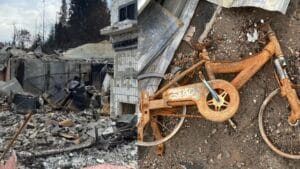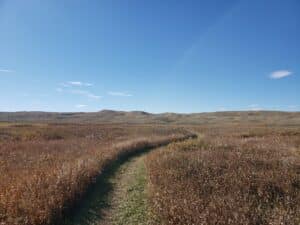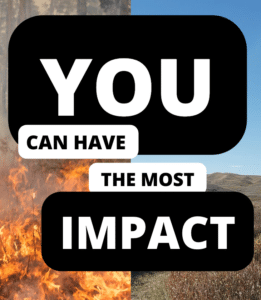Talk to Others & Organize This Election, it’s the Biggest Impact You Can Have (Outside Voting)
Energy workers deserve REAL renewable solutions. There are strong ties between many oil and gas corporations and American interests. Misinformation spreads regularly on social media, and a lot of mainstream news in Canada is actually American-owned. While it’s still good to engage with others on those platforms to make your voice heard, talking directly to others is also essential.
Canada is facing real crises from threats to our sovereignty to pollution-fueled wildfires and floods that are tearing apart lives, and devastating whole communities. Meanwhile, global demand for oil is set to peak by 2029 and then decline, according to the International Energy Agency, with demand for gas peaking this decade too as other countries shift to renewable energy.
We don’t have to agree on everything to agree that we need action to build a renewable future of our own. Indeed 65% of Canadians agree that renewable energy should take priority (INSTEAD of oil & gas development) when it comes to energy development (March 2025, Leger poll).
Building up Canadian renewable energy and protecting the environment in a fair way are vital to Canada’s independence, to Canada’s economy, to good jobs, to addressing the cost of living, and to our continued health.
In the face of these existential threats to Canada, the environment is not just some secondary issue – but as we’ve talked about before on our podcast (below) is actually front and centre. This election please vote, but also talk to others in your circle and – most importantly – beyond your circle.
Ways to Talk to Others (see things to talk about below)
As well as voting, please go out and talk to other people about renewable energy and environmental protection and encourage them to vote. You can do this in a number of different ways:
- You can do non-partisan canvassing in your neighborhood by literally walking out your door and going to as many houses as you can to chat with people in your community. Candidates are going door to door, so can you.
You might start by simply saying ‘hi, I’m your neighbour and I’m here representing myself and the future that I care about, got a moment to chat?’
-
You can message, email, or phone your contacts and chat with them that way.
- You can also make a point of going to public events or even organize one yourself.
A public event can work, but it could even be just talking with community members over tea.. There’s no single event that’s good for every social situation so just think about what works well for reaching people you normally wouldn’t reach out too.
- And of course you can write letters to the editor of your local newspapers, call in to call in radio, or talk about the issues on social media. All of those are still good ways to advocate on environmental issues. These days anyone can be an influencer – including you.
All of this is important because one of the biggest impacts you can have as well as voting is letting others know why we need renewable energy solutions for employment and the economy, and environmental protections to safeguard our future, now more than ever. Share with them how this election matters to our ability to keep commitments with respect to respecting Indigenous rights and protecting and restoring nature.
Person to person interactions – especially with anyone who is not as informed as you are – matter more than any social media content. And, even though not everyone will be receptive, the more conversations you have with people unsure of these issues, the better. Don’t spend ten hours talking to one person, spend one hour each talking to ten people.
It really is not worth your time to argue with someone who just doesn’t care about the environment as an issue, but at the same time it isn’t very useful to talk with people who already agree it’s a vital issue. Your goal should be to talk to people who do not know how they feel about environmental protection and renewable energy.
Here are a few other things to consider in starting these conversations:
- The most important thing to remember is to meet people where they are at and to listen to their concerns and find common ground. Remember the environment and renewable energy are deeply tied to issues like jobs, Canadian sovereignty, and the cost of living. You can use simple analogies to help people better understand environmental issues and genuinely connect with them on shared concerns. Start your conversations by asking other people what concerns them, then share your concerns, and then share some solutions.
You might start a conversation by simply asking someone ‘what concerns you most about climate change?’ Then you can share what concerns you most, and once you have found some common ground you can get into why renewable energy is a part of the solution.
- Simple analogies help people understand issues without having to have a degree on the subject, and when used right they actually help build critical thinking skills. This is something we had the pleasure of hearing from John Cook – a researcher who has studied climate denial – about in the past.
Like if someone says climate change is not real because it happens to be cold out that day you could say something like ‘well just because the sun goes down during night time doesn’t mean the sun doesn’t exist.’
Things You Can Talk About
And you can keep connecting environmental issues back to other issues as well because they are deeply interrelated – here are a few examples:
- Renewable energy solutions are a great way we can build a stronger, more resilient, and more independent Canadian economy. By creating more green jobs we can create stable and localized employment that helps get us off oil and gas dependency.
- Again oil and gas demand globally is expected to peak this decade and go into decline.
- We already have renewable solutions for when the sun does not shine or the wind does not blow, such as interconnecting grids, diversified renewables, energy storage, and energy efficiency. But we cannot control global oil and gas prices and markets.
- For every additional dollar of inflation in Canada, that YOU pay, 25 cents of that dollar was going to oil and gas and mining extraction profits as of 2023. Our dependence on oil and gas is one of the biggest drivers of inflation in our country and it’s a huge liability in terms of Canada’s sovereignty.
- Relying on oil and gas for employment and energy leaves us exposed to the decisions of other countries and exposed to international crises. These international factors can cause rapid shifts in oil and gas prices that are beyond our control.
- There are also strong ties between many oil and gas corporations in Canada and American interests which is why it’s so important we do renewable energy growth differently. We need a renewable energy future that’s based on a Canadian supply chain, for example by using Canadian aluminum and Steel in wind turbines. We need to make sure any data centres in Canada are powered by renewable energy since it localizes benefits and creates more jobs. That renewable future that can also build up Canadian manufacturing in the process.
- Pollution from oil and gas corporate activities also strongly impacts healthcare. The health impacts of ambient air pollution could cost Canada billions in health-related costs this decade alone and could claim thousands of Canadian lives, if we do nothing. That’s even before factoring in climate change impacts.
Oil and gas corporations, while only 5% of Canada’s economy, are Canada’s most polluting sector causing around 30% of national emissions. Between 1990 and 2022, emissions from oil sands production grew by 467% and conventional oil production by 24% – since 2005 emissions overall increased 11%. Meanwhile, other sectors, and individual Canadians, cut their emissions.
Thirteen oil and gas corporations operating or based in Canada are also on the list of 88 big carbon polluters being called out for a major share of the forested lands lost to wildfires in North America between 1986 and 2021.
- We can protect the environment in a fair way.
But let’s not forget climate change. Climate impacts are also making an increasing number of homes in Canada un-insurable. We’re losing communities and lives to wildfires, and extreme storms, and without action that will get worse.
Adaptation is not enough, we need to prevent future harm to our climate by cutting pollution.
 Anyone who has ever lit a campfire will know that the conditions into which a spark enters matter. If it’s dry and hot then fires start more easily, and they burn faster and hotter. Well pollution is driving Canadian wildfires by making conditions dryer and hotter and Canada can and should be a leader in addressing that problem.
Anyone who has ever lit a campfire will know that the conditions into which a spark enters matter. If it’s dry and hot then fires start more easily, and they burn faster and hotter. Well pollution is driving Canadian wildfires by making conditions dryer and hotter and Canada can and should be a leader in addressing that problem.
- Water is also under threat from American interests, as are natural spaces like the Great Lakes.
If we want to talk about true Canadian resilience then ensuring local ecosystems and water are protected is one of the best ways we can build that resilience. Canada’s strength, our ability to weather hard economic times, is fundamentally tied to local biodiversity, water, and green spaces. Abundant and clean water is central to growing food and farming communities. Biodiversity is threatened right now and it doesn’t need to be. There are plenty of solutions out there that can help solve social problems, like the need for more housing and the cost of living, while also protecting the ecosystems our communities rely on.
The old story that it’s always a question of the economy versus the environment overlooks the fact that our local economies in Canada, the economies that give us strength in times of crisis, are reliant on the environment.
- There’s also the value of nature just as nature to consider – of leaving behind an environment that generations to come can come to enjoy and respect. It’s no wonder that being able to be in nature improves people’s mental health when times are most stressful – and times are stressful right now. Many of us feel a connection to nature and understand nature’s value is not just in what it gives us – no matter what else we believe in.
- Canada has committed to protecting 30 percent of our land and water by 2030.
- There’s The Great Lakes Compact.
- Canada has signed the Glasgow Climate Pact in which we joined 100+ other countries from around the world in committing to stop deforestation. Meanwhile the federal administration in the US is opening up its forests for more clearcutting.
As you start to talk to others about the above, please pass along the talking skills you learn to others who care about these issues as well.
As always, subscribe for updates if you’d like to see more content like this and email us at communications@sierraclub.ca with any questions you may have.
And remember to vote and to remind others to vote.
 The person who can make the biggest impact right now in advocating for our environment and renewable energy, the person who can make sure all the candidates know that we care, the person who can reach out to the most people to keep them informed…
The person who can make the biggest impact right now in advocating for our environment and renewable energy, the person who can make sure all the candidates know that we care, the person who can reach out to the most people to keep them informed…
That person is YOU.
Check out our podcast below about the above!
You can also listen to it on Apple Podcasts, Spotify, IHeartRadio, or Youtube, and on our website – or wherever you get your podcasts.
Authorized by Sierra Club Canada Foundation. 613-241-4611 // 1-888-810-4204
info@sierraclub.ca

